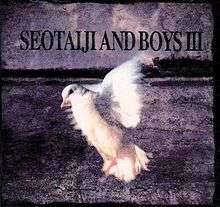Seo Taiji and Boys III
| Seo Taiji and Boys III | ||||
|---|---|---|---|---|
 | ||||
| Studio album by Seo Taiji and Boys | ||||
| Released | August 13, 1994 | |||
| Studio | Conway Studios, Techno Taiji, Atachi Studio | |||
| Genre | Rap rock, alternative metal, pop | |||
| Language | Korean | |||
| Label | Bando Eumban | |||
| Producer | Seo Taiji | |||
| Seo Taiji and Boys chronology | ||||
| ||||
Seo Taiji and Boys III is the third studio album by Korean musical trio Seo Taiji and Boys.
Overview
This third album switched gears to being much more heavy metal and rock driven. It was partially recorded in Los Angeles using American session musicians.[1] The danceable tunes are nearly non-existent except "Balhaereul Ggumggumyeo" (발해를 꿈꾸며, "Dreaming of Balhae"), an alternative rock song which indicates a hope of reuniting North and South Korea. Instead, songs such as the controversial "Kyoshil Idaeyo" (교실 이데아, "Classroom Ideology") with death growl vocals by Ahn Heung-chan of thrash metal band Crash take center stage.
The version of the album included in Seo Taiji's 15th anniversary box set adds a remix of "Kyoshil Idaeyo" and six live tracks, including a cover of "Farewell to Love" originally by Seo's previous band Sinawe.
Controversies
The songs "Kyoshil Idaeyo", "Dr. Jekyll and Mr. Hyde" and "Nae Mamiya" (내 맘이야, "That's How I Feel") highly criticized the older generation of Koreans and their education system.[2]
"Kyoshil Idaeyo" was extremely critical of the education system and the pressure placed on the country's youth to succeed academically. The fact that Seo is a high school dropout himself added to the discussion, with the group labelled as a negative influence to young people.[3][4] The song was banned from TV and radio, even though the government run Public Performance Ethics Committee gave the song a pass.[2]
Shortly after the album's release, the group were accused of backmasking Satanic messages in their songs, specifically in "Kyoshil Idaeyo". Although the mainstream news media later proved these accusations to be based on extremely tenuous evidence, the moral panic proved difficult to eliminate entirely.[4][5]
Reception
In April 1996, Billboard reported that the album had sold over 1.6 million copies.[6]
Kyunghyang Shinmun ranked the album number 57 on its 2007 list of the Top 100 Pop Albums.[7]
Track listing
All tracks written by Seo Taiji, except track 9 written by Yang Hyun-suk and track 13 written by Kim Jong-seo and composed by Kim Jong-seo and Shin Daechul.
| No. | Title | Length |
|---|---|---|
| 1. | "Yo! Taiji" | 0:45 |
| 2. | "Balhaereul Ggumggumyeo" (발해를 꿈꾸며 (해동성국)) | 4:40 |
| 3. | "Through the Eyes of Children" (아이들의 눈으로) | 5:07 |
| 4. | "Kyoshil Idaeyo" (교실 이데아) | 4:22 |
| 5. | "Nae Mamiya" (내 맘이야) | 3:01 |
| 6. | "Dr. Jekyll and Mr. Hyde" (제킬박사와 하이드) | 5:12 |
| 7. | "Eternity" (영원 (永遠)) | 3:46 |
| 8. | "Balhaereul Ggumggumyeo" (발해를 꿈꾸며 (Instrumental)) | 4:40 |
| 9. | "Neol Jiulyeo Hae" (널 지우려 해) | 4:35 |
| 15th Anniversary Edition (2007)/ Remaster (2009) | ||
|---|---|---|
| Track listing | ||
| No. | Title | Length |
| 10. | "Opening ('95 Daleun Haneul-i Yeolligo)" (Opening ('95 다른 하늘이 열리고)) | 2:12 |
| 11. | "Neol Jiulyeohae ('95 Daleun Haneul-i Yeolligo)" (널 지우려해 ('95 다른 하늘이 열리고)) | 5:20 |
| 12. | "Neoege (Ijeneun Neoege, '95 Daleun Haneul-i Yeolligo)" (너에게 (이제는 너에게, '95 다른 하늘이 열리고)) | 4:39 |
| 13. | "Farewell to Love ('95 Daleun Haneul-i Yeolligo)" (Farewell to Love ('95 다른 하늘이 열리고)) | 5:05 |
| 14. | "Taiji Solo ('95 Daleun Haneul-i Yeolligo)" (태지 Solo ('95 다른 하늘이 열리고)) | 4:01 |
| 15. | "Kyoshil Idaeyo ('95 Daleun Haneul-i Yeolligo)" (교실 이데아 ('95 다른 하늘이 열리고)) | 7:47 |
| 16. | "'07 Kyoshil Idaeyo (Remix)" ('07 교실 이데아 (Remix)) | 3:40 |
Personnel
- Seo Taiji − vocals, keyboards on tracks 2−5, 8 & 9, guitar on tracks 4 & 6, bass on tracks 4 & 6, computer programming on tracks 3 & 9, drum machine on track 5
- Yang Hyun-suk − vocals
- Lee Juno − vocals
- Tim Pierce − guitar on tracks 2, 5 & 8, acoustic guitar on tracks 2 & 8
- John Pierce − bass on tracks 2, 8 & 9
- Josh Freese − drums on tracks 4, 6 & 9
- Denny Fongheiser − drums on tracks 2 & 8
- Ahn Heung-chan − vocals on tracks 4 & 5
- Gwon Seonmi − cello on tracks 2 & 8
- Japan King − Orchestra strings on track 7
- Choe Taewan − acoustic piano on track 3
- DJ Qbert − scratching on tracks 4 & 5
- Kim Seog-jung − remix of track 16
References
- ↑ Craig, Timothy J.; King, Richard (April 20, 2002). Global Goes Local: Popular Culture in Asia. UBC Press. p. 90.
- 1 2 The Korean Popular Culture Reader. Duke University Press. March 7, 2014. p. 301.
- ↑ Mitchell, Tony (January 1, 2002). Global Noise: Rap and Hip Hop Outside the USA. Wesleyan University Press. p. 251.
- 1 2 "Way Back Wednesday: Seo Taiji & Boys - "Nan Arayo"". allkpop.com. 2010-11-18. Retrieved 2016-07-02.
- ↑ "서태지와아이들 노래 거꾸로 들으면 악마 소리 나온다는 소문[오정환]". MBC Newsdesk (in Korean). 1994-11-03. Retrieved 2016-07-03.
- ↑ Seoul Music: Rockin' in Korea; April 20, 1996. Billboard. p. 18.
- ↑ "[대중음악 100대 명반]57위 서태지와 아이들 '서태지와 아이들 III'". Kyunghyang Shinmun (in Korean). 2008-03-20. Retrieved 2016-07-03.